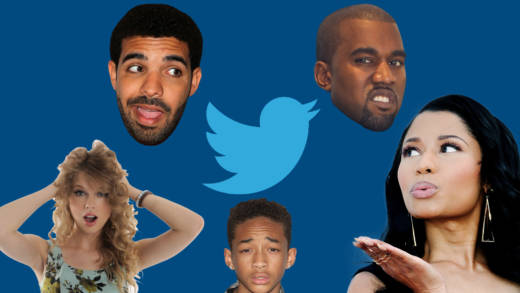Last weekend, Jaden Smith -- son of Will and Jada Pinkett, and purveyor of dreadlocks as hand accessories -- took to Twitter to make a very serious accusation. "The Four Seasons In Toronto Spiked My Pancakes With Cheese," he capitalized. "I'm Surprised I'm Still Alive."
Is It Possible to Have Celebrity Heroes in the TMI Age of Twitter?

It was part of a wider rant in which Jaden declared that he wanted to "Throw Up On [Him]self" and get put on the hotel's "No Stay List."
Despite the pettiness, privilege, and strange ideas about the dangers of dairy that this outburst laid bare for the public, Jaden's meltdown was not a momentary lapse in judgment; he has not deleted the tweets, which means that, several days on, he's still not embarrassed about assuming that, as a vegan, he could die from ingesting cheese. (Has anyone mentioned to Jaden that Four Seasons pancakes probably already contain eggs and milk? Does Jaden know what vegans are allowed to eat?)
Of course, all of this, while incredibly entertaining, seems, in the grand Twitter-related scheme of things, rather petty as long as we have an acting President who uses Twitter as a means to shame his perceived enemies, rant about foreign affairs, and disparage media outlets. For his supporters, President Trump's Twitter account is the stuff of dreams -- a window into every idea he has, as he has it; for his detractors, it's a national embarrassment; and for almost everyone watching, it is extraordinarily surreal to see a POTUS communicating with the world in this manner.
There is no doubt that future generations will look back on this moment in time and see Twitter as an absolute game-changer in the political sphere. But truthfully, Twitter has been having a seismic impact on how the world interacts with itself, and its famous people, for years now. This particular form of social media has absolutely changed not only the nature of how popular culture is disseminated and discussed, it has forever altered the proximity we are able to feel to our heroes. For all intents and purposes, if a celebrity is on Twitter, the world has a direct line to them. Which is why Jimmy Kimmel's "Mean Tweets" segments are so simultaneously satisfying and funny:
These days, Twitter is a means for celebrities to drunk dial the world, make announcements about both their work and personal lives, and reach out to their fans in a way that simply wasn't possible in the communication dark ages, pre-2006. Just weeks ago, Nicki Minaj used the website to send tuition money to her fans struggling through college. Twitter is also the medium that Ariana Grande has been using to communicate with the world since the atrocity at her Manchester Arena show -- and it all feels significantly more personal than releasing a press release to news outlets and waiting for that information to trickle down.
The unfortunate downside to all of this easy exchange of information is that we now get an insight into our celebrity darlings that can frequently make us think less of them. Twitter may have humanized famous folks, but with that familiarity comes reality so unfiltered, it is almost impossible in 2017 to keep our heroes on their pedestals. Beyoncé is basically the only major star in America still managing to retain any mystery at all, and that's probably due, in no small part, to the fact that she's one of the few celebrities that rarely uses Twitter at all. Sticking to the relatively silent medium of Instagram gives her exposure, without giving so much away:
It speaks volumes of how over-exposed we are now, that Beyoncé's level of restraint is widely viewed as a major feat, even though we all just bore witness to her baby shower. We, as a nation, have become so completely accustomed to watching famous people not just share themselves with us, but also duke it out amongst themselves, that online feuds barely even register anymore. Who can even keep track at this point?
In recent years, the Kardashians have turned the Twitter feud into an art form (Khloé vs. Amber Rose, Rob vs. Rita Ora, Kim vs. Chloë Moretz, Khloé vs. Chloë Moretz, etc. etc. ) and Azealia Banks is basically propping up an entire career on the back of her account. Drake's been in trouble, though he usually airs beefs in song form (that old traditionalist!); Nicki Minaj isn't afraid to get into it (Taylor Swift was the big one), Rihanna's been in spats (Ciara, Charlie Sheen); Zayn Malik has gotten into it (Calvin Harris and Louis Tomlinson); and Kanye West's Twitter account is the gift that keeps on giving (unless you're Jimmy Kimmel or Wiz Khalifa).
There is a point when "Stars: They're just like us!" stops being endearing. Finding out that your heroes are as flawed and human as everyone in your every day life leaves the entertainment world with a gaping hole where the icons used to be. The golden age of cinema, for example, was possible because the stars of the day remained a mystery. Would we still swoon over Fred Astaire and Ginger Rogers if we'd known the ins and outs of their private lives? Would Marlene Dietrich remain such a fascinating figure today if her public image hadn't been so carefully controlled? Imagine how different the 1980s would have been if Madonna, Prince, and Michael Jackson were online and bickering all the time. Would we have idolized them in the same way? It's doubtful.
In the internet age, it's fair to say that if we are awake, we are bombarded with information. Now, more than ever, we need mystery and intrigue as a form of escape from the daily deluge. If only stars could find a way to keep some of themselves offline and out of the spotlight, their fans could return to loving them the way they used to. Just ask Beyoncé.

